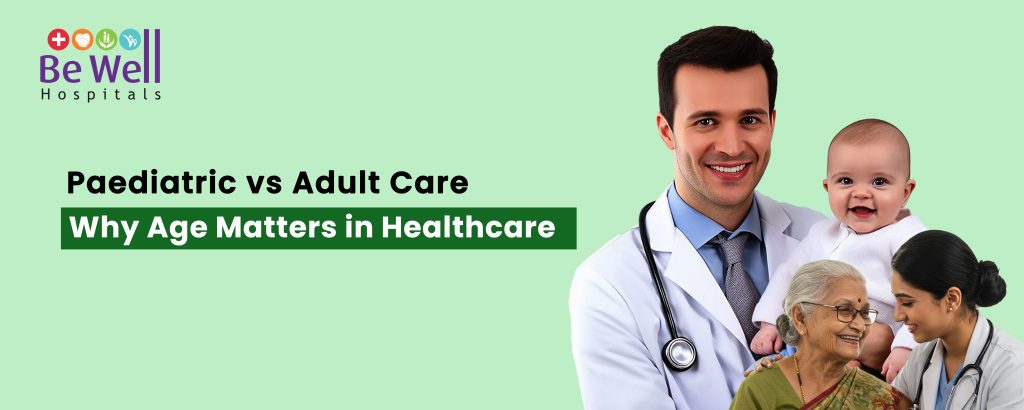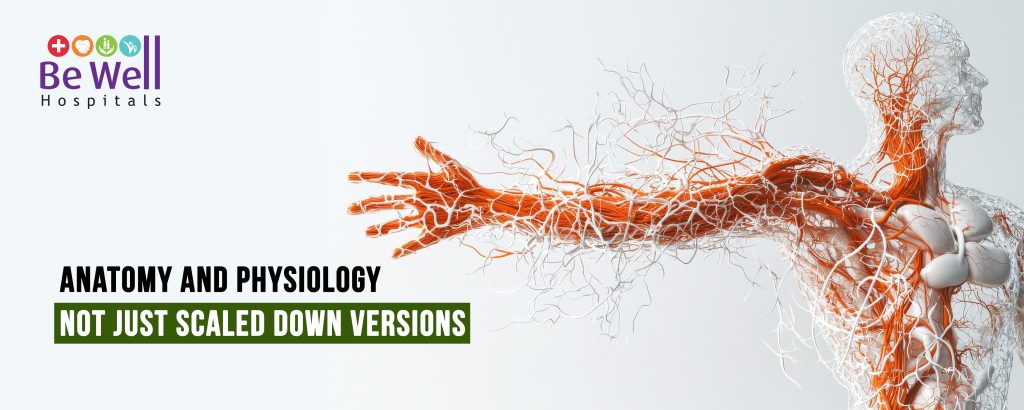
Introduction
Healthcare isn’t one-size-fits-all—especially when comparing paediatric and adult care. While both strive for healing and wellness, the approach, complexity, and communication in treating children versus adults differ greatly. From diagnosis to emotional support, every aspect of care must be tailored to age-specific needs. This blog explores the key distinctions between paediatric and adult healthcare—why children aren’t just “small adults,” and how age truly shapes the healing journey.
Developmental Needs Drive Medical Approach
Children are in a continuous state of growth—physically, mentally, and emotionally. This dynamic development demands that paediatric care be tailored to a child’s age and stage. A fever, speech delay, or lack of appetite can have entirely different implications depending on age. Medications must be carefully dosed based on weight and metabolic rate to avoid complications.
Adult care, by contrast, is often centred around managing chronic conditions, preventing degeneration, and maintaining stability. As adults age, their immunity and organ function gradually decline, shifting the focus of care to monitoring long-term risks and preserving quality of life.
Anatomy and Physiology: Not Just Scaled Down Versions

Children have developing organs, smaller airways, and a faster metabolism. Minor issues like vomiting or dehydration can escalate quickly, and respiratory infections pose greater risks due to narrower airways. Their faster metabolism also affects how medications are processed, requiring precise dosing.
In adults, the metabolism slows, and the body becomes more resilient to minor fluctuations—but more prone to long-term wear, making them more susceptible to chronic illness. These physiological differences mean that each age group requires specific protocols, treatment techniques, and monitoring methods.
Disease Patterns and Symptom Expression Vary Widely
The types of illnesses commonly seen differ with age. Children often face infectious diseases, developmental delays, asthma, or congenital disorders. Adults tend to deal with lifestyle-driven diseases like diabetes, high blood pressure, and cardiovascular issues.
Symptom expression also varies. A child with a urinary infection may just appear cranky or have a poor appetite, while an adult might report specific pain. Children often struggle to describe their symptoms, so clinical observation and caregiver input are vital in diagnosis.
Preventive Care: Vaccination vs. Screening
Prevention looks very different across life stages. In paediatrics, vaccination is the cornerstone of preventive care. Immunisation schedules protect children during their most vulnerable years and are timed to align with immune system maturity.
In adult care, the emphasis shifts to screening for early signs of chronic diseases like hypertension, diabetes, and cancers. Routine checkups focus on risk reduction through lifestyle interventions, managing comorbidities, and long-term medication management.
Mental and Emotional Support Tailored to Age
Children experience illness with limited understanding, so care must be sensitive, supportive, and often include the family. Paediatric care relies on play therapy, parental involvement, and trust-building to reduce fear and aid emotional recovery.
Adults may face stress, depression, loneliness, or anxiety due to health conditions, lifestyle stressors, or aging. Their care emphasizes independence, mental resilience, and support through therapy, counselling, or stress-management strategies. Whether comforting a child or empowering an adult, emotional care is crucial in recovery.
Nutrition: Fuel for Growth vs. Disease Prevention
Nutrition goals shift drastically between children and adults. In childhood, the focus is on supporting brain development, bone strength, and immune resilience. Nutrients like calcium, iron, and protein are vital for proper growth and development.
In adults, nutrition plays a preventive role. A balanced diet helps prevent or manage diseases like diabetes, obesity, and cardiovascular disorders. Fiber, lean proteins, healthy fats, and hydration become central. In older adults, nutrition supports bone density, muscle maintenance, and energy levels. While both life stages require balanced diets, the goals and impact are different.
Communication and Consent: Who Makes the Decisions?
In paediatrics, decision-making lies with parents or guardians. Doctors must communicate in age-appropriate ways, both to the child and their caregivers, to ensure understanding and cooperation. The child’s comfort and consent, while not always legally binding, are considered to foster trust and reduce fear.
Adults are primary decision-makers in their own care. Healthcare professionals must focus on informed consent, autonomy, and respect for personal choices. Building mutual understanding and offering patient education are key pillars of adult care.
Approach to Chronic Illness
Chronic conditions manifest differently across age groups. In paediatrics, some chronic illnesses—like juvenile diabetes, congenital heart conditions, or developmental disorders—require specialized teams and early intervention to ensure long-term well-being.
In adults, chronic disease management is often centered around lifestyle interventions, medication, and prevention of complications. With advancing age, multimorbidity (having multiple chronic conditions) becomes common, making coordinated care essential.
Family and Social Dynamics in Treatment

Paediatric care is inseparable from family support. Parents or guardians are involved in every step—from understanding symptoms to ensuring follow-ups and medication adherence. Doctors act not just as medical providers but as guides and educators for the entire family.
In adult care, while family may play a supportive role, the emphasis is on the individual’s responsibility for their health. Older adults may need caregivers, but the expectation is to maintain independence as much as possible. Understanding these dynamics ensures that care remains patient-centered across all ages.
Transitioning from Paediatric to Adult Care
One of the most important yet challenging aspects of care is transitioning adolescents into the adult healthcare system. Teenagers with chronic conditions must learn to manage their health independently. This involves educating them about their condition, medication, and lifestyle choices.
Doctors help bridge this gap by preparing both the adolescent and family for the shift in responsibility. A smooth transition ensures continuity of care and helps prevent drop-offs in treatment, which could lead to complications or setbacks.
Conclusion
While both paediatric and adult care aim to improve health, the journey looks vastly different depending on age. Children need growth-focused, nurturing environments, while adults benefit from autonomy and preventive care. From nutrition and emotional support to diagnosis and communication, understanding these differences enables more personalized, effective treatment. Healthcare works best when it meets people where they are in life—whether that’s holding a child’s hand through a vaccination or guiding an adult through a diabetes management plan. At Be Well Hospitals, we are committed to delivering age-appropriate, compassionate care at every stage of life. To learn more or schedule a consultation, call 9698 300 300 today or visit your nearest Be Well Hospitals.
